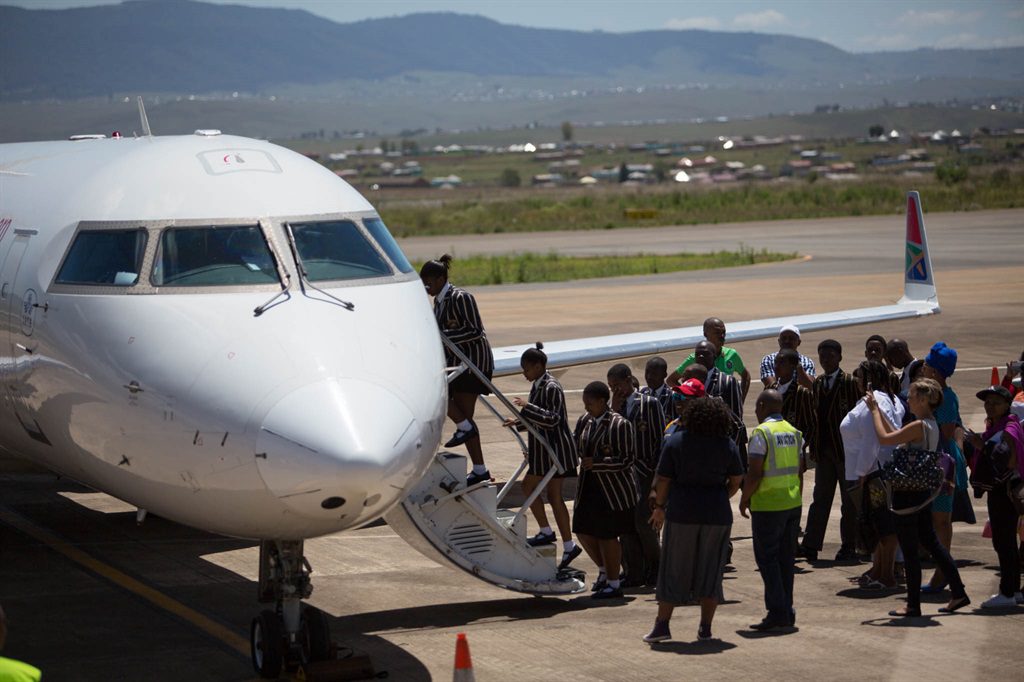Did government blink in the face of SAX demands? It had been reported that, finally, there was a voice of reason within the government regarding public funding for failed state-owned enterprises (SOEs). But, subsequent developments may contradict this.
Last week, Finance Minister Tito Mboweni dismissed the SA Express (SAX) request for another R200 million in the form of a government guarantee.
The Free Market Foundation (FMF) was initially delighted. SAX and South African Airways (SAA) are festering sores from apartheid. They contribute nothing to the economy or aviation that is not readily available from the tax-paying private sector more efficiently, more cheaply, and without billions wasted on bailouts.
However, the grounding of all SAX aircraft last week was, according to industry insiders, not for “operational” reasons, as stated, but because SAX could not pay the airports company (ACSA) the R70 million it owes. Previously SAX planes were grounded by the SA Civil Aviation Authority between May and August 2018 for safety reasons.
That on Friday, ACSA lifted the suspension suggests that the debt was paid. But by whom? Funding could have come only from government or a bank backed by a government guarantee. The facts are unlikely to be revealed now but will be exposed when the Standing Committee on Appropriations reviews SOE airlines. The truth cannot be hidden indefinitely.
What has happened to the R1.25bn given to SAX in November? Why could they not pay ACSA? The R1.25bn bailout and government-backed bank loan of R300m seem to have disappeared. On what was the money spent?
Loose talk of SAX being an “essential feeder” to SAA is nonsense. Currently, SAX flies only four—yes four—planes out of a nominal fleet of 22 aircraft. These appear to typically fly half empty. Efficient, viable and profitable private carriers are far better placed to fly shorter routes cost-effectively, without begging for subsidies.
On-time performance (OTP) records for SAX are dismal. In July SAX managed only 59.85 percent OTP of flights that actually departed. If canceled flights were recorded, SAX’s OTP would have been about 25 percent for the months of July and August 2019. If passengers on private airlines experienced such consistently poor OTP, they would vote with their pockets and fly elsewhere. What SAX is good at is holding out its Treasury begging bowl. The idea of merging SAA and SAX belies common sense. Two failed airlines do not make a viable one.
Tales of corruption and cronyism continue to spew from the Zondo commission. They suggest that SAX has been used for diverting public funds from the poor. National interest demands that no more public money should be wasted on SAX or SAA. There is no longer a place in modern aviation for subsidized national carriers. Vibrant and expanding private airlines can and do deliver more jobs, routes, services, schedules, and destinations, at less cost.
The government should spend taxes on essential services for the poor and not on the rich to fly.
SAX has not produced audited financial statement (AFSs) since FY2015/6. The FMF has submitted an access to information (PAIA) request to SAX demanding answers to questions relating to its parlous finances.
A critical point is what really happened in 2010 when the company’s spares were revalued and senior management, including CEO Siza Mzimela, received huge bonuses. She alone received R3.2 million bringing her total 2010 remuneration to R5.2 million.
The FMF also queried why the AFS for that period was removed recently from the SAX website. Fortunately, we have a copy which is undergoing forensic analysis. We will share the findings with the media.
Industry sources say that SAX will be unable to issue AFS since its internal accounting and inventory systems are such that the Auditor General cannot give a clean audit. Banks lend depositor’s money to dodgy SAX only because of Treasury backing.
In response to our previous media release (view here), the FMF received a petulant letter from SAX. Far from responding to our queries, SAX accused us of being a front for competitors, and of falsely saying SAX management could not be contacted.
With our 45-year impeccable advocacy track record on behalf of consumers and the public, especially the poor, the FMF knows how to interpret histrionic responses.
The FMF is an independent, non-profit, public benefit organization, created in 1975 by pro-free market business and civil society national bodies to work for a non-racial, free and prosperous South Africa. As a policy organization, it promotes sound economic policies and the principles of good law.

